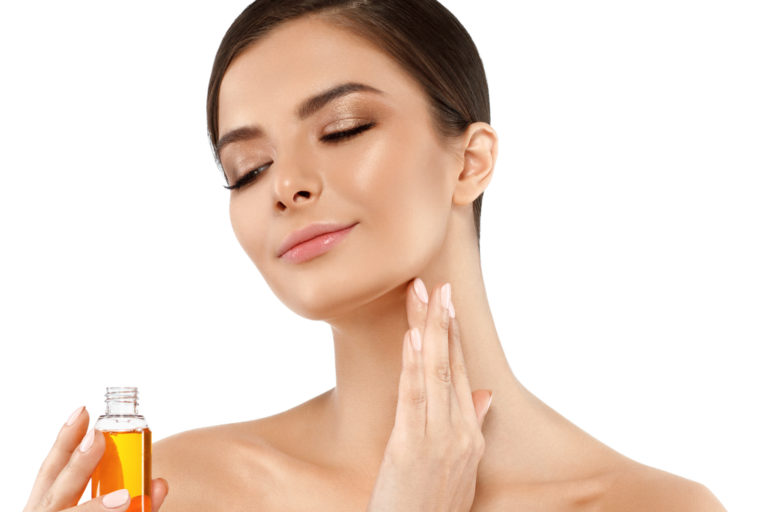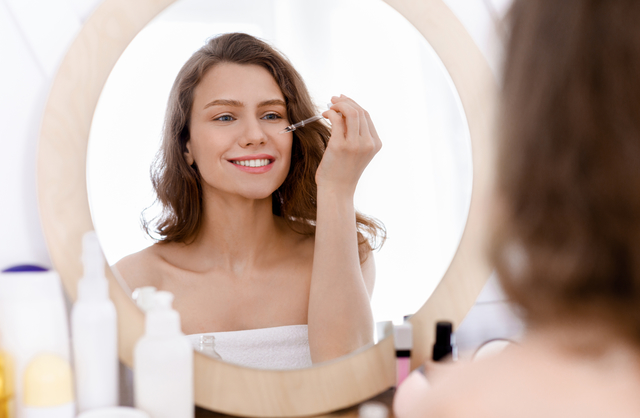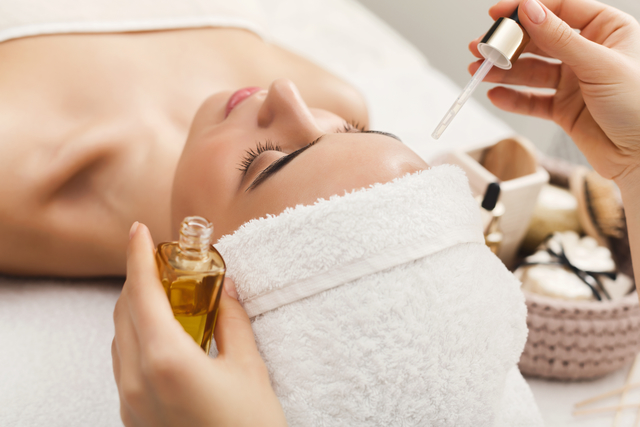Face oiling has been controversial for several years, the procedure has a group of supporters and opponents. Most people think that they clean best foaming cosmetics that dry and wash sebum accumulated on the surface of the skin. In contrast, the ingredients contained in this type of makeup removers or face cleaners violate the skin’s natural lipid coat, which means that without a natural protective barrier, the skin activates sebaceous glands to over-produce sebum. As a result, we have even more contaminated and irritated skin. The OCM technique involves chemical determination that fat dissolves best in fat.
Face oiling – Japanese technique based on the use of vegetable oils.
It consists of natural cleansing and simultaneous moisturizing of the face, neck and cleavage. OCM (Oil Cleansing Method) is an inexpensive and easy way to preserve beautiful complexion. Using natural oils for daily care and make-up removal, we can remove from the skin surface not only makeup, dust, smog, but also sebum produced by sebaceous glands, which will completely dissolve in them. We will not disturb either the protective lipid barrier or its proper pH. Additional benefits of oiling – reduction of skin flaccidity, fine mimic wrinkles, its deep hydration and natural regeneration.
Oil selection
Facial oiling is best done with castor oil. Its composition is most similar to the sebum produced by our skin. However, castor oil alone can over-dry our skin, so you need to combine it with another base oil. Proportions must be adapted to the type of skin:
Dry skin: 10-15% castor oil + 85-90% base oil
Normal and combination skin: 20% castor oil + 80% base oil
Oily skin: 30% castor oil + 70% base oil
* The proportions can be modified to suit her individual skin needs.
Face oiling – how to choose base oil?
The choice of base oil depends on our face type. For oily, seborrheic skin, light, non-clogging oils pores are better: neroli oil, sweet almonds. Dry skin is more demanding. It’s best to choose oils with a higher density, e.g. coconut oil, argan oil or cocoa butter. Base oils with similar consistency can be combined to harness the power of their diverse properties.
Dry or mature skin: olive oil, argan oil, borage oil, raspberry seed, wheat germ, apricot seed, grape seed, pumpkin seed, avocado, sweet almond, coconut, rose. See: Skeyndor facials
Normal skin: pomegranate seed oil, jojoba oil, avocado, apricot seed, sweet almond, linseed oil.
Oily and acne skin: sesame, rice, hazelnut oil, cherry seed oil, safflower oil (in the case of acne skin, the selected base oil should be additionally enriched with tea tree oil, orange skin oil, vitamin E and A).
Capillary skin: oil from kitty, hazelnut, oil from passion fruit, rose hips and blackcurrant.
We start the procedure by preparing a mixture of selected oils.
It is best to store such a mixture in a dark glass bottle (which protects it from light and oxidation) at room temperature. We will also need a small towel or a cotton cloth. Oiling is best done in the evening, because our face can be greasy and shiny (colored cosmetics used for makeup will not look aesthetically pleasing on oily skin, their durability will also not be satisfactory)
Oiling effects
The effects of oiling usually appear one month after starting the treatment. We often observe temporary deterioration of the skin. Blackheads or individual inflammation may appear. If we observe that our skin clearly suffers after OCM, it is burning, very dry, red and irritated… It means that oiling is simply not for us or indicates incorrect selection of products. In this case, you should immediately give up this procedure in favor of traditional makeup removal.
Face oiling – the most common mistakes
Incorrect oil selection
When deciding to include vegetable oils for skin care, it is very important to choose an oil whose action and properties will suit our skin type. Oils are divided into: non-drying, semi-drying and drying. This is the most important criterion that should be followed when buying oils. The second issue is comedogenic potential – it determines whether a product can clog the sebaceous glands. As a consequence, blackheads and purulent pimples may occur.
Moisturizing the skin with oil only
Pure vegetable oils have oiling and not moisturizing properties. They form a protective layer on the surface of the skin that protects it from moisture loss, but it does not have hygroscopic properties that allow water to retain in the cells. Therefore, moisturizing the skin with oil alone can have the opposite effect – even more dry skin.
Incorrect oil storage
Many vegetable oils require refrigeration (e.g. linseed, rose oil). It is absolutely necessary to protect them against direct UV radiation and high temperature. Incorrectly stored product may lose its properties or cause allergies or irritation.
Use of low quality oil
Pure vegetable oils usually do not contain preservatives, so they have a limited shelf life (usually 2-3 months after opening the bottle). After this time, the oils lose their properties and are unfit for use.
It is also a big mistake to buy oils from unverified sources, without labels and expiration dates. Refined oils are also not suitable for use on the skin. When buying oil, you must make sure how the product was stored, what packaging it is in (glass or plastic), and how it was obtained.
Problem skin and oiling
People with very sensitive, acne or rosacea skin must be especially careful. Do not rub with a reusable cloth / towel. The more we rub the face, the more irritated the skin, which leads to more inflammation. It’s best to use disposable cotton scarves or wash off oil residue with water only. Vascular skin does not tolerate too high temperatures, so the towel cannot be soaked in too hot water.
Body oiling
Body oiling is one of the best natural ways to make your skin more elastic and moisturized, especially in the winter and autumn. Oils great greasing, do not contain artificial substances, rarely cause allergies. Unrefined and cold pressed natural oils are rich in a number of vitamins, minerals and fatty acids. They are necessary for the reconstruction of the epidermis and the proper functioning of the skin. That is why it is worth adding this treatment to your daily routine.
The effect of oiling on the skin of the body:
- strongly moisturizes, nourishes and oils the skin,
- prevents TEWL, i.e. evaporation of water from the epidermis,
- rejuvenates the skin, prevents photo-aging, by the content of natural protective filters,
- soothes irritation after depilation, prevents ingrown hair,
- reduces the visibility of scars and stretch marks,
- unifies skin tone and structure,
- accelerates skin regeneration after delivery, prevents stretch marks during pregnancy.
The effects of oiling face and body
As a rule, every oil has a protective, oiling, binding water in the epidermis, elasticity, tightening the epidermis, regenerates and strengthens the hydrolipid barrier.
The effects of individual oils:
- Olive oil moisturizes the skin, smoothes it, has anti-inflammatory properties, is ideal for very dry and sensitive skin;
- grape seed is a very rich source of vitamin E, i.e. a natural antioxidant that protects cell membranes against oxidative stress;
- coconut contains substances with antifungal and antibacterial activity;
- sesame soothes, moisturizes, smoothes and firms the epidermis;
- almond is rich in vitamins A, D, E and B vitamins, also contains proteins, mineral salts, omega-3 and omega-6 fatty acids;
- sunflower protects against water loss, normalizing and oiling;
- argan has a strongly regenerating and strengthening effect, contains vitamin E as well as linoleic and linolenic acid;
- from raspberry seeds regenerates and soothes the epidermis, is rich in vitamins E and A. Contains essential fatty acids, has anti-inflammatory properties;
- with avocado, it makes the skin more elastic and firm, mature and flabby, soothes and moisturizes, strongly oils;
- peach kernel works especially for sensitive and children’s skin, very rarely allergic, contains a lot of B vitamins;
- from watermelon seeds has a moisturizing effect, it is one of the lightest oils, the skin after it is not burdened;
- jojoba has similar properties to human sebum, has a similar consistency, has a glossy effect, prevents water loss, protects the skin against the influence of harmful external factors. Strengthens its resistance, is suitable for acne and demanding skin, reduces dandruff and stretch marks;
- macadamia nuts and walnut oil have anti-aging and antioxidant properties, macadamia tones and softens the epidermis. Walnut soothes and regulates sebaceous glands and keratinization;
- Castor makes the skin elastic, suitable for washing the body and hair. Used alone, it can dry out.
- Eucalyptus and tea tree oil – oils that have antiseptic and antibacterial properties. They are used in acne skin care and also accelerate skin regeneration processes.










